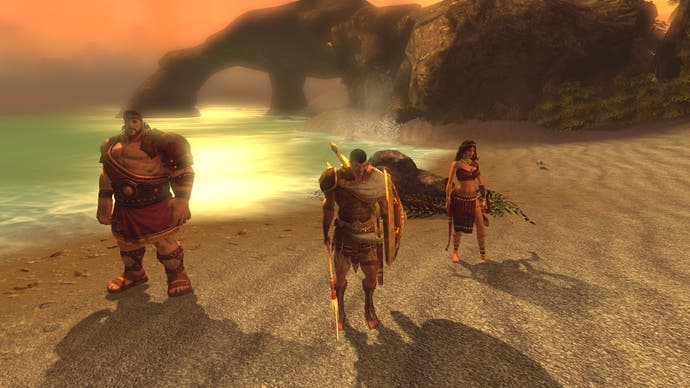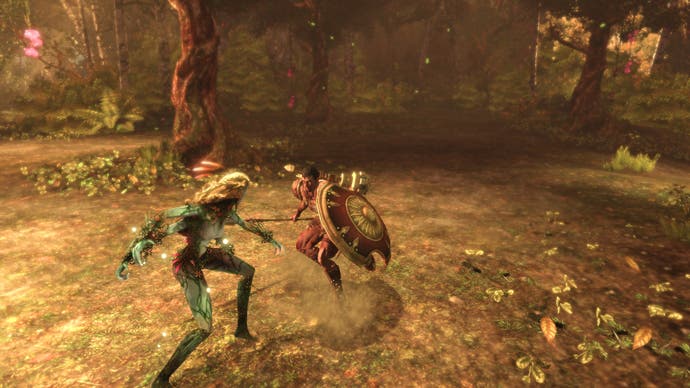Rise of the Argonauts
Liquid Entertainment on redefining role-play.
Jason and the Argonauts made bold cinematic footprints in 1963, largely thanks to painstakingly created stop-motion animation widely considered as one of the greatest achievements in 20th Century film. We can still remember those plasticine skeletons being smashed all over the place, and Jason's battle with the three-headed Hydra. It's a tale so well known that when Codemasters announced it was remaking the tale with developer Liquid Entertainment, we felt a little joy rising inside.
Rise of the Argonauts is a role-playing game for the new consoles and PC, and has all the graphical grunt and spit-shine we've come to expect from them. But rather than be just another blockbuster, Liquid Entertainment wants to re-interpret what a game in this genre should offer. It isn't happy with the good, evil, and neutral stock responses to non-player characters, or unintuitive battle systems and repetitive combat. Pages of menus clogged with statistics or laborious micro-management are a no-no, too, but most of all it is the effect of choice on the world it wants to rectify.
All of which sounds like rather a tall order. So, excited by the prospect of being Todd Armstrong as Jason, and curious as to how all these promises will manifest, we sat down with Liquid Entertainment's lead designer Charley Price for a chin-wag.

In Rise of the Argonauts, you take on the role of Jason, a young warrior king whose bride is assassinated on their wedding day. In order to bring her back, Jason sets out aboard his massive warship, the Argo, in search of the Golden Fleece - a mantle of judgement that is the only known artefact that can unmake death. Along the way, Jason will encounter a host of characters from Greek Mythology, including Hercules, Atalanta, and others - and recruit them to join him as Argonauts on his journey.
As such, Rise of the Argonauts is essentially a creative retelling of the classic story with a greater focus on exploring the world of ancient mythological Greece, and giving players the opportunity to really explore and interact with the legendary people and places which are part of that world. Those who are familiar with the classic story will certainly recognize key characters and defining moments represented in our game.
Rise of the Argonauts is a role-playing game that focuses on the strengths of the genre (strong story, character development, meaningful choices) while discarding the antiquated trappings that plague it (endless menus, bag/inventory management, minor statistic-tweaking, etc.).
Furthermore, because Jason's progression is tied to his favour with the gods, Jason's powers and abilities will grow by virtue of everything you do - be it a cunning choice in dialogue or decapitating a foe in combat. Every choice matters In Rise of the Argonauts.
Rise of the Argonauts also sports real-time, lethal combat unlike any you've ever seen in an RPG. Rather than stabbing someone 20 times in the chest before they fall down, in our game, when blade meets flesh, expect lethal consequences. Bypass an enemy's shield (by deflecting an attack, dodging around, or simply smashing through it with your mace), and they will no doubt meet a quick and bloody end.
Using our procedural animation system, Jason will target enemies independently - his shield rising to block an attack from the left as his right arm swings outwards, decapitating an enemy on his right - all with the touch of a button. Every combat encounter is unique, every encounter is lethal.

Rise of the Argonauts' combat system is deceptively simple, but very meaningful and rewarding in a number of new and interesting ways. Because we have the potential for one-hit kills based on hitting enemy flesh and the ability to procedurally animate characters, every fight becomes unique.
A shield bash will use physics to impact an enemy's shield out of the way, potentially leaving them open for a deadly thrust of the spear. As such, watching for and creating vulnerabilities becomes simple and rewarding. Our combat system genuinely reinforces the deadly laws of cause and effect that you would expect in a film or in reality - which, combined with dynamic animations, creates a whole new combat experience.
So many games that rely on action and pre-set animations for their characters end up feeling dry and repetitive as the game progresses. But this makes sense, if you think about it. A scene from an action movie can be the coolest sequence in the world - but if you watch it over and over again for hours and days on end, it eventually loses its lustre. The same can be said for canned animations. If you consider each animation to be a very short cinematic, you can see how combat encounters begin to subconsciously feel more mundane and repetitive now you've seen the same "XXY" combo animation thousands of times.
By procedurally animating our characters, not only does every combat look and feel different, but those small adjustments matter - changing a sword slash from one that would harmlessly clang off of an enemy's shield, to one that slips underneath it, slicing that enemy in two.
In terms of the overall scope of gameplay, we strike a strong balance between combat, narrative, and exploration of the world - each of which allows Jason to progress as a character (through Deeds), as a hero (getting ever closer to the Golden Fleece), and as a leader (gathering Argonauts to his side).


